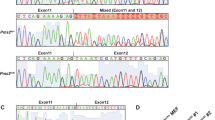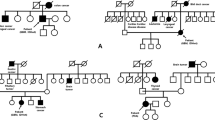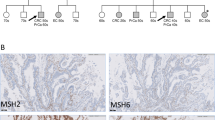Abstract
Heterozygous germline mutations in mismatch repair (MMR) genes MLH1, PMS2, MSH2, and MSH6 cause Lynch syndrome. New studies have indicated that biallelic mutations lead to a distinctive syndrome, childhood cancer syndrome (CCS), with haematological malignancies and tumours of brain and bowel early in childhood, often associated with signs of neurofibromatosis type 1. We provide further evidence for CCS reporting on six children from two consanguineous families carrying homozygous PMS2 germline mutations. In family 1, all four children had the homozygous p.I590Xfs mutation. Two had a glioblastoma at the age of 6 years and one of them had three additional Lynch-syndrome associated tumours at 15. Another sibling suffered from a glioblastoma at age 9, and the fourth sibling had infantile myofibromatosis at 1. In family 2, two of four siblings were homozygous for the p.G271V mutation. One had two colorectal cancers diagnosed at ages 13 and 14, the other had a Non-Hodgkin's lymphoma and a colorectal cancer at ages 10 and 11, respectively. All children with malignancies had multiple café-au-lait spots. After reviewing published cases of biallelic MMR gene mutations, we provide a concise description of CCS, revealing similarities in age distribution with carriers of heterozygous MMR gene mutations.
Similar content being viewed by others
Log in or create a free account to read this content
Gain free access to this article, as well as selected content from this journal and more on nature.com
or
References
de la Chapelle A : Genetic predisposition to colorectal cancer. Nat Rev Cancer 2004; 4: 769–780.
Ionov Y, Peinado MA, Malkhosyan S, Shibata D, Perucho M : Ubiquitous somatic mutations in simple repeated sequences reveal a new mechanism for colonic carcinogenesis. Nature 1993; 363: 558–561.
Lynch HT, Smyrk TC, Watson P et al: Genetics, natural history, tumour spectrum, and pathology of hereditary nonpolyposis colorectal cancer: an updated review. Gastroenterology 1993; 104: 1535–1549.
Vasen HF, Wijnen JT, Menko FH et al: Cancer risk in families with hereditary nonpolyposis colorectal cancer diagnosed by mutation analysis. Gastroenterology 1996; 110: 1020–1027.
Umar A, Boland CR, Terdiman JP et al: Revised Bethesda Guidelines for hereditary nonpolyposis colorectal cancer (Lynch syndrome) and microsatellite instability. J Natl Cancer Inst 2004; 96: 261–268.
Dunlop MG : British Society for Gastroenterology; Association of Coloproctology for Great Britain and Ireland. Guidance on gastrointestinal surveillance for hereditary non-polyposis colorectal cancer, familial adenomatous polypolis, juvenile polyposis, and Peutz-Jeghers syndrome. Gut 2002; 51: V21–V27.
Liu B, Parsons R, Papadopoulos N et al: Analysis of mismatch repair genes in hereditary non-polyposis colorectal cancer patients. Nat Med 1996; 2: 169–174.
Peltomaki P : Deficient DNA mismatch repair: a common etiologic factor for colon cancer. Hum Mol Genet 2001; 10: 735–740.
Goecke T, Schulmann K, Engel C et al: Genotype-phenotype comparison of German MLH1 and MSH2 mutation carriers clinically affected with Lynch syndrome: a report by the German HNPCC Consortium. J Clin Oncol 2006; 24: 4285–4292.
Plaschke J, Engel C, Kruger S et al: Lower incidence of colorectal cancer and later age of disease onset in 27 families with pathogenic MSH6 germline mutations compared to families with MLH1 or MSH2 mutations. J Clin Oncol 2004; 22: 4486–4494.
Nakagawa H, Lockman JC, Frankel WL et al: Mismatch repair gene PMS2: disease-causing germline mutations are frequent in patients whose tumors stain negative for PMS2 protein, but paralogous genes obscure mutation detection and interpretation. Cancer Res 2004; 64: 4721–4727.
Truninger K, Menigatti M, Luz J et al: Immunohistochemical analysis reveals high frequency of PMS2 defects in colorectal cancer. Gastroenterology 2005; 128: 1160–1171.
Worthley DL, Walsh MD, Barker M et al: Familial mutations in PMS2 can cause autosomal dominant hereditary nonpolyposis colorectal cancer. Gastroenterology 2005; 128: 1431–1436.
Hendriks YM, Jagmohan-Changur S, van der Klift HM et al: Heterozygous mutations in PMS2 cause hereditary nonpolyposis colorectal carcinoma (Lynch syndrome). Gastroenterology 2006; 130: 312–322.
De Vos M, Hayward BE, Charlton R et al: PMS2 mutations in childhood cancer. J Natl Cancer Inst 2006; 98: 358–361.
Wang Q, Lasset C, Desseigne F et al: Neurofibromatosis and early onset of cancers in hMLH1-deficient children. Cancer Res 1999; 59: 294–297.
Ricciardone MD, Ozcelik T, Cevher B et al: Human MLH1 deficiency predisposes to haematological malignancy and neurofibromatosis type 1. Cancer Res 1999; 59: 290–293.
Vilkki S, Tsao JL, Loukola A et al: Extensive somatic microsatellite mutations in normal human tissue. Cancer Res 2001; 61: 4541–4544.
Wagner A, Reddingius R, Kros J et al: Wilms tumor and glioblastoma in a child with double MLH1 germline mutation. Fam Cancer 2003; 2: 57.
Gallinger S, Aronson M, Shayan K et al: Gastrointestinal cancers and neurofibromatosis type 1 features in children with a germline homozygous MLH1 mutation. Gastroenterology 2004; 126: 576–585.
Raevaara TE, Gerdes AM, Lonnqvist KE et al: HNPCC mutation MLH1 P648S makes the functional protein unstable, and homozygosity predisposes to mild neurofibromatosis type 1. Genes Chromosomes Cancer 2004; 40: 261–265.
Rey JM, Noruzinia M, Brouillet JP, Sarda P, Maudelonde T, Pujol P : Six novel heterozygous MLH1, MSH2, and MSH6 and one homozygous MLH1 germline mutations in hereditary nonpolyposis colorectal cancer. Cancer Genet Cytogenet 2004; 155: 149–151.
Whiteside D, McLeod R, Graham G et al: A homozygous germ-line mutation in the human MSH2 gene predisposes to haematological malignancy and multiple cafe-au-lait spots. Cancer Res 2002; 62: 359–362.
Bougeard G, Charbonnier F, Moerman A et al: Early onset brain tumor and lymphoma in MSH2-deficient children. Am J Hum Genet 2003; 72: 213–216.
Hegde MR, Chong B, Blazo ME et al: A homozygous mutation in MSH6 causes Turcot syndrome. Clin Cancer Res 2005; 11: 4689–4693.
Menko FH, Kaspers GL, Meijer GA, Claes K, van Hagen JM, Gille JJ : A homozygous MSH6 mutation in a child with cafe-au-lait spots, oligodendroglioma and rectal cancer. Fam Cancer 2004; 3: 123–127.
Ostergaard JR, Sunde L, Okkels H : Neurofibromatosis von Recklinghausen type I phenotype and early onset of cancers in siblings compound heterozygous for mutations in MSH6. Am J Med Genet A 2005; 139: 96–105.
Scott RH, Mansour S, Pritchard-Jones K, Kumar D, MacSweeney F, Rahman N : Medulloblastoma, acute myelocytic leukemia and colonic carcinomas in a child with biallelic MSH6 mutations. Nat Clin Pract Oncol 2007; 4: 130–134.
Hamilton SR, Liu B, Parsons RE et al: The molecular basis of Turcot's syndrome. N Engl J Med 1995; 332: 839–847.
de Rosa M, Fasano C, Panariello L et al: Evidence for a recessive inheritance of Turcot's syndrome caused by compound heterozygous mutations within the PMS2 gene. Oncogene 2000; 19: 1719–1723.
Trimbath JD, Petersen GM, Erdman SH, Ferre M, Luce MC, Giardiello FM : Cafe-au-lait spots and early onset colorectal neoplasia: a variant of HNPCC? Fam Cancer 2001; 1: 101–105.
De Vos M, Hayward BE, Picton S, Sheridan E, Bonthron DT : Novel PMS2 pseudogenes can conceal recessive mutations causing a distinctive childhood cancer syndrome. Am J Hum Genet 2004; 74: 954–964.
Agostini M, Tibiletti MG, Lucci-Cordisco E et al: Two PMS2 mutations in a Turcot syndrome family with small bowel cancers. Am J Gastroenterol 2005; 100: 1886–1891.
Bandipalliam P : Syndrome of early onset colon cancers, hematologic malignancies & features of neurofibromatosis in HNPCC families with homozygous mismatch repair gene mutations. Fam Cancer 2005; 4: 323–333.
Gottschling S, Reinhard H, Pagenstecher C et al: Hypothesis: possible role of retinoic acid therapy in patients with biallelic mismatch repair gene defects. Eur J Pediatr 2007; E-pub ahead of print.
Kruger S, Plaschke J, Jeske B et al: Identification of six novel MSH2 and MLH1 germline mutations in HNPCC. Hum Mutat 2003; 21: 445–446.
Plaschke J, Kruger S, Pistorius S, Theissig F, Saeger HD, Schackert HK : Involvement of hMSH6 in the development of hereditary and sporadic colorectal cancer revealed by immunostaining is based on germline mutations, but rarely on somatic inactivation. Int J Cancer 2002; 97: 643–648.
Boland CR, Thibodeau SN, Hamilton SR et al: A National Cancer Institute Workshop on Microsatellite Instability for cancer detection and familial predisposition: development of international criteria for the determination of microsatellite instability in colorectal cancer. Cancer Res 1998; 58: 5248–5257.
Kolodner RD, Hall NR, Lipford J et al: Structure of the human MLH1 locus and analysis of a large hereditary nonpolyposis colorectal carcinoma kindred for mlhl mutations. Cancer Res 1995; 55: 242–248.
Kolodner RD, Hall NR, Lipford J et al: Structure of the human MSH2 locus and analysis of two Muir-Torre kindreds for MSH2 mutations. Genomics 1994; 24: 516–526.
Ng PC, Henikoff S : Accounting for human polymorphisms predicted to affect protein function. Genome Res 2002; 12: 436–446.
Ramensky V, Bork P, Sunyaev S : Human non-synonymous SNPs: server and survey. Nucleic Acids Res 2002; 30: 3894–3900.
Vasen HF, Watson P, Mecklin JP, Lynch H : New clinical criteria for hereditary nonpolyposis colorectal cancer (HNPCC, Lynch syndrome) proposed by the International Collaborative group on HNPCC. Gastroenterology 1999; 116: 1453–1456.
Guarne A, Junop MS, Yang W : Structure and function of the N-terminal 40 kDa fragment of human PMS2: a monomeric GHL ATPase. EMBO J 2001; 20: 5521–5531.
Gu L, Hong Y, McCulloch S, Watanabe H, Li GM : ATP-dependent interaction of human mismatch repair proteins and dual role of PCNA in mismatch repair. Nucleic Acids Res 1998; 26: 1173–1178.
Basaran N, Sayli BS, Basaran A, Solak M, Artan S, Stevenson JD : Consanguineous marriages in the Turkish population. Clin Genet 1988; 34: 339–341.
Plaschke J, Linnebacher M, Kloor M et al: Compound heterozygosity for two MSH6 mutations in a patient with early onset of HNPCC-associated cancers, but without hematological malignancy and brain tumor. Eur J Hum Genet 2006; 14: 561–566.
Muller A, Schackert HK, Lange B et al: A novel MSH2 germline mutation in homozygous state in two brothers with colorectal cancers diagnosed at the age of 11 and 12 years. Am J Med Genet A 2006; 140: 195–199.
Edelmann L, Edelmann W : Loss of DNA mismatch repair function and cancer predisposition in the mouse: animal models for human hereditary nonpolyposis colorectal cancer. Am J Med Genet C Semin Med Genet 2004; 129: 91–99.
Stumpf DA, Alksne JF, Annegers JF et al: Neurofibromatisis: conference statement. Arch Neurol 1988; 45: 575–578.
Landau M, Krafchik BR : The diagnostic value of cafe-au-lait macules. J Am Acad Dermatol 1999; 40: 877–890.
Wang Q, Montmain G, Ruano E et al: Neurofibromatosis type 1 gene as a mutational target in a mismatch repair-deficient cell type. Hum Genet 2003; 112: 117–123.
Acknowledgements
We thank Ms M Reichmann, Ms S Steiner, and Mr A Schiewart for excellent technical assistance. This work was supported by the Verbundprojekt ‘Familiärer Darmkrebs’ of the Deutsche Krebshilfe (DKH, German Cancer Aid, 70-3032).
Author information
Authors and Affiliations
Corresponding author
Rights and permissions
About this article
Cite this article
Krüger, S., Kinzel, M., Walldorf, C. et al. Homozygous PMS2 germline mutations in two families with early-onset haematological malignancy, brain tumours, HNPCC-associated tumours, and signs of neurofibromatosis type 1. Eur J Hum Genet 16, 62–72 (2008). https://doi.org/10.1038/sj.ejhg.5201923
Received:
Revised:
Accepted:
Published:
Issue date:
DOI: https://doi.org/10.1038/sj.ejhg.5201923
Keywords
This article is cited by
-
Hereditäre kolorektale Karzinogenese
Die Pathologie (2023)
-
Germline variants of DNA repair genes in early onset mantle cell lymphoma
Oncogene (2021)
-
Recommendations on Surveillance and Management of Biallelic Mismatch Repair Deficiency (BMMRD) Syndrome: A Consensus Statement by the US Multi-Society Task Force on Colorectal Cancer
American Journal of Gastroenterology (2017)
-
Gastrointestinal Findings in the Largest Series of Patients With Hereditary Biallelic Mismatch Repair Deficiency Syndrome: Report from the International Consortium
American Journal of Gastroenterology (2016)
-
Pitfalls in the diagnosis of biallelic PMS2 mutations
Familial Cancer (2015)



